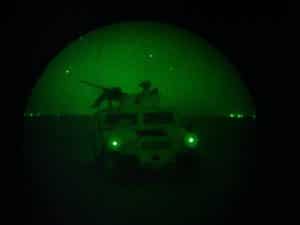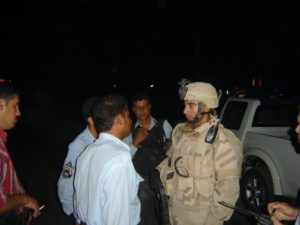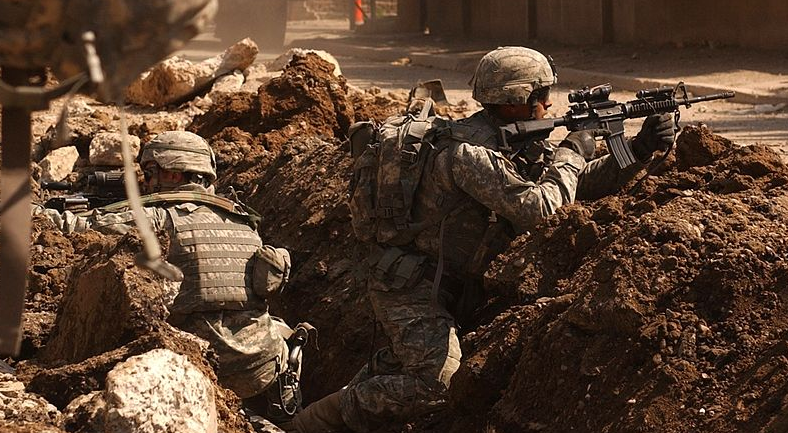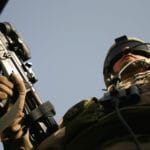Editor’s Note: Also read Ayman’s previous articles “A Middle Eastern Veteran’s Struggle with His Own Community” and “A Middle Eastern Veteran’s Welcome to ‘Mortar City’ and to the ‘Praetorians‘”.
It was in the middle of the night in the cold Iraqi desert. Sounds funny to say cold desert. The Praetorians and Spartan 6 were conducting a combat patrol during an Iraqi election. Every time an election came around in Iraq, it was met with violence and intimidation from various terrorist groups throughout the country. Our mission that night was to ensure the ballots made it through our Area of Operations (AO) without any problems.
One of the gunners informed us that there was someone down the road digging at the side of the road. As we moved toward him, he ran off. We gave chase but lost him in one of the local villages. We ended up clearing all the mud huts in the village. As we went through each hut, I would order the occupants to keep their hands where we could see them. Unfortunately, we were unable to find this person. We went back to the area where we initially saw him and saw the IED he was assembling. It was safe to be close to it since it hadn’t been completed. We called in EOD to get rid of the device.

Praetorian on guard
I walked around with my fellow Praetorians as Spartan 6 was talking with the prison warden near Mosul. I kept my eyes and ears on the Iraqi Police (IP) walking with the warden and Spartan 6. Spartan 6 was using a local interpreter at the time and I purposely kept quiet just in case I was able to gain any intel from unsuspecting IPs that didn’t know I spoke Arabic. A male subject walked by me with a Glock pistol in his hands, hiding it in the small of his back. I walked behind him, yelling out to him in Arabic “STOP. DO NOT MOVE ANOTHER STEP.” He froze in his tracks. I told him to drop the gun and step back before I shoot him. He complied. The warden quickly shouted that the male subject was one of his IPs. He was part of his protective detail.
Could that have been a possible attempted assassination of Spartan 6? Was the IP an Al-Qaeda Terrorist that made it into the IPs? So many questions were going through my head. He was eventually identified and let go.
There were times I suspected certain Iraqis I spoke with were there to do more harm than good. I found it frustrating that the Iraqis did not have a concept of fighting for their country. They would fight for a religious figure, dictator, or ideology. They did not understand the concept of persons of mixed races and religions fighting for each other and their country.
One day, while we (Spartan 6) talked to some Iraqis, I pointed out that our whole squad was made up of people from all races and religions. I explained that we fought for each other and our country.

Talking to IPs
I was asked several times by the Iraqis why I joined the U.S. military. My response was always the same: “I JOINED TO HELP AND SEPARATE THE BAD ARABS FROM THE GOOD ONES.” It’s something I needed to do when the U.S. went to war in the Middle East. I knew my country needed someone like me. American service members were about to step into a world that would be tough to understand.

Laughing with some Iraqis
I called home one day and spoke to my sister. She told me of how this man in a pick-up truck tried to run my mother off the road. She dresses in traditional Middle Eastern clothing and has a thick accent. A thought flashed through my mind: “Why the hell am I out here fighting for a country that doesn’t care about my culture.” I was angry that I faced backlash over joining the U.S. Military and fighting in the Middle East within the Middle Eastern community. To me, I was surrounded by “enemies” on both sides of the pond. Whether the enemy was racism or terrorism, I was surrounded by it. Racism wasn’t just from a fellow American but also from those from within the Middle Eastern community. Mind you, at my time in war, I was a green card holder and not a U.S. Citizen yet. It wasn’t until a few years later, after INS found my lost file, that I became a U.S. Citizen.
____________________________
This first appeared in The Havok Journal on June 2, 2020.
Ayman Kafel is the founder and owner of Hybrid Wolf Blue Line Strategies, LLC. A veteran-owned training and consulting company for Law Enforcement officers and agencies. He combines his military and law enforcement experience to bring much-needed cutting-edge training to the law enforcement profession.
Ayman is not only an active police officer but also a law enforcement instructor and has taught across the East Coast of the United States. He offers a wide variety of training, such as advanced patrol tactics, mechanical breaching courses, designated marksman, and Human Performance under duress.
In addition, Ayman is an Army Combat Veteran who was deployed during Operation Iraqi Freedom in 2005. He became a police officer in 2007 after 8 years of service in the Army
Ayman has seen the ugliness of war and evil in the world. He survived two civil wars prior to immigrating to the United States in the late eighties.
His current position is the commander of his department’s Problem-Oriented Policing Unit. He leads a team of investigators that employs unconventional methods and Special Forces philosophy in achieving specific objectives in the communities he serves. These unconventional methods range from winning hearts and minds to specific strategic law enforcement actions to arrest and prosecute those who are the root cause of various crimes.
To reach Ayman, feel free to email him at hwbluelinestrategies@gmail.com

As the Voice of the Veteran Community, The Havok Journal seeks to publish a variety of perspectives on a number of sensitive subjects. Unless specifically noted otherwise, nothing we publish is an official point of view of The Havok Journal or any part of the U.S. government.
Buy Me A Coffee
The Havok Journal seeks to serve as a voice of the Veteran and First Responder communities through a focus on current affairs and articles of interest to the public in general, and the veteran community in particular. We strive to offer timely, current, and informative content, with the occasional piece focused on entertainment. We are continually expanding and striving to improve the readers’ experience.
© 2024 The Havok Journal
The Havok Journal welcomes re-posting of our original content as long as it is done in compliance with our Terms of Use.



